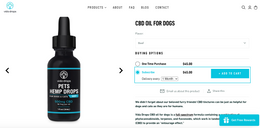What You Should Know About CBD and Your Pets
Since Colorado legalized recreational marijuana use in 2012, we've discovered a seemingly endless list of applications for cannabis in humans. Chronic pain, anxiety, and even seizures can be treated with this magical little plant--particularly with CBD. Given that CBD use has proven so successful (and with few to no adverse side effects), consumers have started to pivot attention to potential benefits of CBD for their pets.
Research on CBD use in pets is sparse, but forward-thinking members of the veterinary community are starting to compile some exciting data. Stephanie McGrath, a neurologist at Colorado State University College of Veterinary Medicine and Biomedical Sciences, is one of the veterinarians at the forefront of research into CBD use in pets. McGrath began researching CBD and its effects on pets in 2016, partly because people kept asking and partly because she didn't see a lot of research on the topic in her field.
It's this lack of research that can make administering CBD to your pets a tricky decision. Like all mammals, cats and dogs have an endocannabinoid system but don't process CBD in the same way humans do. A McGrath study showed that CBD can be effective in treating seizures in epileptic dogs, and long term studies are still ongoing.

Anecdotal evidence from pet owners across the country seems to indicate that CBD is most effective in treating three main conditions: epileptic seizures, pain and inflammation (especially related to arthritis), and anxiety. Benefits of--and response to--CBD will vary from one animal to the next, and more research still needs to be done before more conclusive statements can be made.
A recent study showcased that dogs and cats metabolize CBD differently. Researchers found that cats maintain a much lower concentration in their system than dogs, even when given the same amount at the same intervals. The study concluded that while CBD appears to be safe and beneficial for dogs, more detailed research is needed to determine why cats absorb and metabolize CBD differently.
Since the data on CBD metabolism in cats is quite fuzzy (pardon the pun), from here on out we'll be talking only about dogs.
If you're feeling disheartened by this uncertainty, don't be! The lack of data around CBD use in pets simply means that you need to handle treatment of your fur babies with care. Thankfully, CBD is a relatively safe product, especially if you are sourcing pet-specific products from reputable companies. If you've checked that box, there are just a few other things to consider.
Talking to your Veterinarian
Marijuana is still illegal on the federal level. However, as you may be aware, states are allowed to decide whether to criminalize its use at their level, so long as residents follow the rules.
The 2018 Farm Bill federally legalized CBD as long as it is derived from hemp and contains no more than 0.3% THC (by dry weight). Unfortunately, regulation is difficult to enforce in such an oversaturated market.
This legal grey area, combined with the lack of hard data, may mean that veterinarians are reluctant to discuss CBD treatments for their patients. Even if you live in a state that has legalized CBD use, you'll likely need to start the conversation.
How Do I Give CBD to My Dog?
The most conventional and popular administration method used for humans is great for pets, too: high-quality CBD oil*. CBD infused dog treats are also effective.
Oils are the safest bet due to the controllability of dosage. This, of course, is only the case if you know that the contents of your oil are accurately reported by the companies that distribute them. Oils can be easily (and sneakily) added to your dog's food. Ours come in two flavors for the discerning pup: beef and salmon. The salmon variety is flavored by real salmon oil, packing a one-two punch of CBD and rich omega-3s.
Edibles for pets are also simple and relatively reliable, but variable bioavailability with treats makes it more difficult to really know precisely how much CBD is getting into Fido's system. The same is true of topicals, since the skin presents a significant absorption barrier.
The most important thing to consider when choosing CBD for your pet, regardless of product type, is purity. Make sure the CBD for your dog:
- Comes from a reputable source that submits to testing by independent labs, and transparently provides test results to consumers
- Is produced using a safe and effective extraction method, such as CO2 extraction, that avoids contaminants and results in the highest possible purity
* It's always best to use a pet-specific product and to check with your vet for their thoughts on CBD treatment before administering it to your pet.

How Much CBD Should I Give My Dog?
This is where you have to be careful. Remember, there aren't enough conclusive studies out there for us to know exactly what an effective dose of CBD looks like for animals.
To ensure safety for your dog, talk to your veterinarian before administering CBD. He or she will have information on your pet's medical history, medications that could react negatively with CBD, and any current complications that could influence dosing. You can also lean on your vet for information on how an animal's system metabolizes CBD.
As we mentioned earlier, all mammals have endocannabinoid systems, but the way they function from species to species can vary. For example, dogs have a higher concentration of cannabinoid receptors in their brains than humans. This means they may benefit from lower doses than their human counterparts. It also means they are far more susceptible to potentially toxic effects if THC levels are inaccurate.
When in doubt, always start with a smaller amount. Under-dosing is preferred because you can always increase the dose in small increments if you need to.
To get started with Vida Drops CBD Oil for Pets, we recommend 0.1-0.2 ml per 10 pounds of body weight, given once or twice per day as needed. Start on the low end of the dosing range to see how your pet reacts. If they take it well, you can increase the dosage in small increments for maximum benefit.
When you first begin giving CBD to your dog, keep an eye out for vomiting, diarrhea, restlessness, and trouble standing. These are all symptoms of THC poisoning. If you see any of those reactions, take your pet to the vet immediately. We strongly recommend using only hemp-sourced CBD with verifiable, negligible amounts of THC compounds.
Where to Get Additional Information
If your local veterinarian isn't able or willing to talk about incorporating CBD into your pet's lifestyle, look for a member of the American Holistic Veterinary Medical Association. These doctors are holistically-minded, so they may be more likely to have some advice about CBD dosing.
There's no question that CBD oil can greatly benefit dogs. The key is knowing the appropriate form, amount, and frequency of administration. Given the lack of long-term research in this field, securing the information you need to safely treat your furry friend can be difficult. However, with diligent investigation and open communication with veterinary professionals, effective CBD treatment for animals is possible--and in some cases, life-changing!
Check out what a Vida Drops customer had to say about CBD's effect on her dog, Pants.
The information contained in this article is for educational and informational purposes only and is not intended as health, medical, or veterinary advice. Always consult a physician, veterinarian, or other qualified health provider regarding any questions you may have about a medical condition or treatment options.







